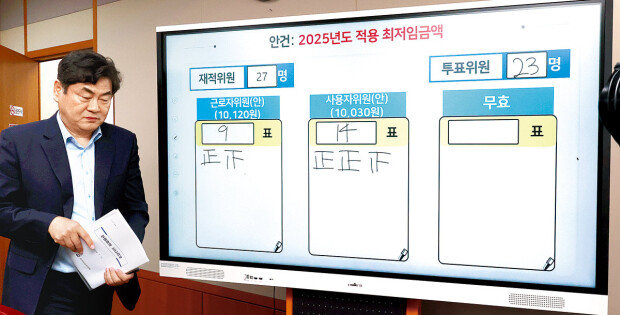Minimum wage sparks backlash from labor and dissatisfaction from management
Minimum wage sparks backlash from labor and dissatisfaction from management
Posted July. 13, 2024 08:00,
Updated July. 13, 2024 08:00

The Minimum Wage Commission set next year's minimum wage at 10,030 won per hour on Friday. This is an increase of 170 won (1.7%) from this year's 9,860 won. It marks the first time in 37 years since the minimum wage system was implemented in 1988 that it has exceeded 10,000 won per hour. When converted to a monthly salary, next year's minimum wage amounts to 2,096,270 won.
The Minimum Wage Commission determined next year's minimum wage during the 11th plenary session, held at around 2:30 a.m. after an all-night meeting that began at 3 p.m. the previous day (Thursday). During the 10th plenary session the previous night, employer and business representatives presented three revised proposals but failed to narrow their differences. Ultimately, the final proposals from the labor and business sectors were 10,120 won and 10,030 won, respectively, referencing a proposal by public interest members. After four worker representatives recommended by the Korean Confederation of Trade Unions (KCTU) walked out, a vote was conducted, with 14 out of 23 members voting in favor of the business sector's final proposal. It appears that the majority of the public interest members sided with the business sector.
Regarding the minimum wage decided for next year, the business sector expressed concerns about the "beginning of the 10,000 won minimum wage era," while the labor sector voiced dissatisfaction with the "second-lowest increase rate in history." The Korea Enterprises Federation announced, "Considering the desperate situation of small and micro-enterprises and small business owners, it should have been frozen," expressing "deep regret." On the other hand, the Federation of Korean Trade Unions criticized the 1.7% increase, saying, "It is the second-lowest increase rate in history after the 1.5% in 2021, effectively resulting in a reduction of real wages."
Ae-Jin Ju jaj@donga.com







